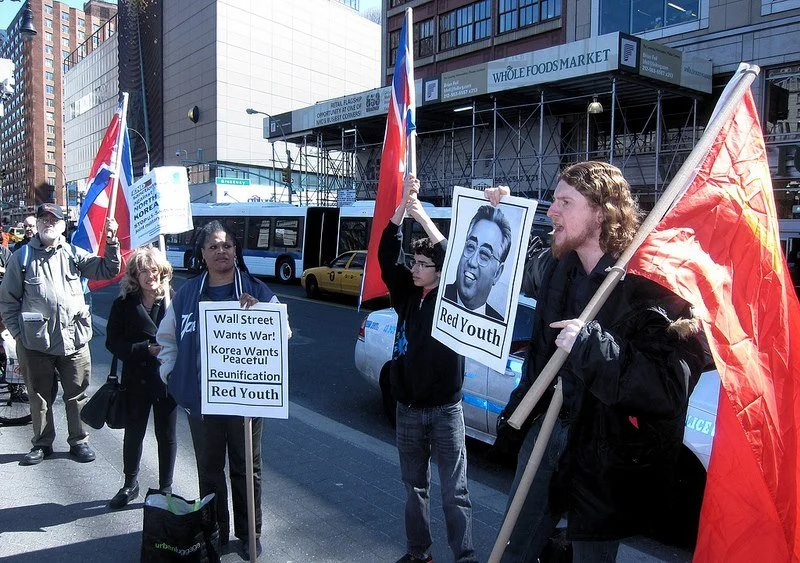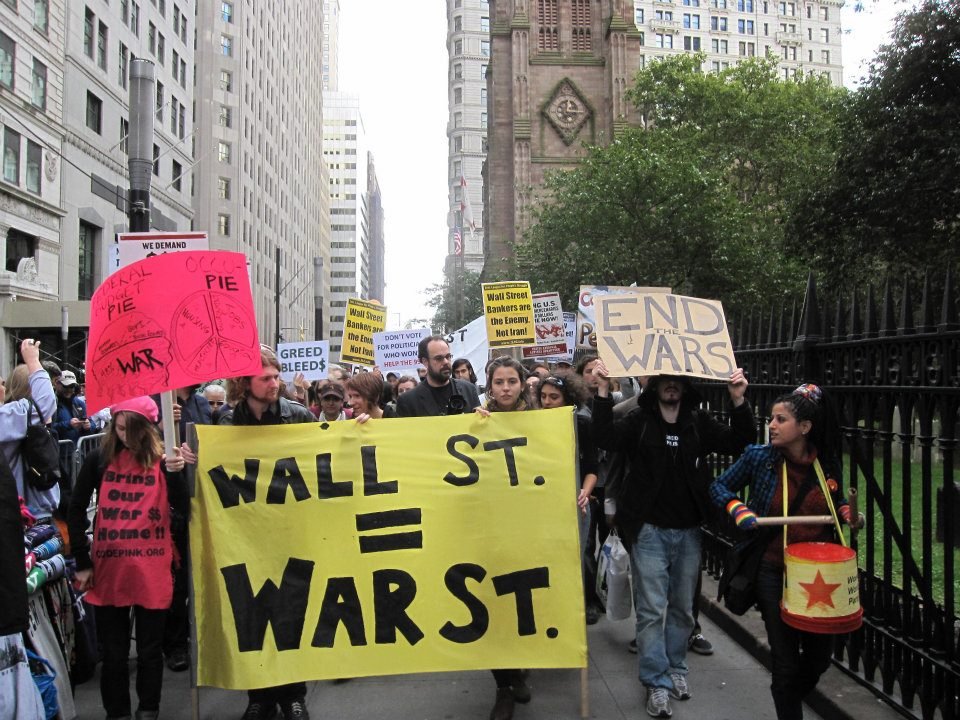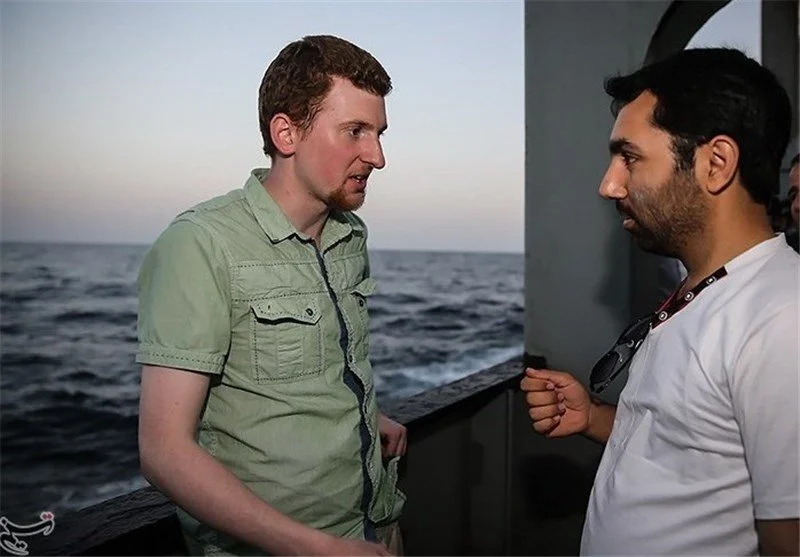Innovationism Will Never Surrender!
An early Center for Political Innovation rally in New York City’s Central Park, 2021.
By William Cecil-Michel Venu
A look back at the origins of the Innovationist current
Pinpointing the exact beginning of the Center for Political Innovation is difficult. Online meetings first emerged during the pandemic, and the earliest in-person gathering took place in Saxton, Pennsylvania in 2021. Yet the ideological seeds of what later solidified into Innovationism were planted roughly a decade before that.
In 2011, Caleb Maupin was an exasperated member of the Workers World Party. By that point he had already established himself as one of the most committed anti-racist and anti-war organizers in the United States. In Cleveland, he filmed police misconduct and helped young Black women beat charges in juvenile court. In his early twenties, he was already teaching Marxist history in bookstores. When he relocated to New York City in December of 2010—initially planning to stay for only a month—the momentum of political struggle kept him there. Before long, he was at the forefront of Occupy Wall Street and serving as a public voice for former U.S. Attorney General and international human rights lawyer Ramsey Clark’s organization.
Caleb Maupin protesting with Workers World Party members to support North Korea in 2012.
Standing with Libya, and Disillusionment with “The Left”
So what left Caleb so fed up in 2011? Libya.
He saw that Muammar Gaddafi had presided over a thriving, socialist country. Libya held the highest life expectancy in Africa. It had constructed the world’s largest irrigation project—the Great Man-Made River. Gaddafi was chair of the African Union and had announced his intention to form an independent African investment bank and new currency backed by gold. After seriously studying The Green Book, Caleb concluded that Libya operated on socialist economic foundations.
The Workers World Party leadership, however, refused to see Libya that way. To them, because Gaddafi was an Islamic socialist rather than a strict Marxist-Leninist, Libya was only a “bourgeois nationalist regime.” Caleb pointed out Libya’s state-led economy rooted in an anti-colonial revolution, its past bid to join the Warsaw Pact, and its financial support for the Black Panthers. None of this was of any concern.
When the color revolution erupted and the United States began bombing Libya, WWP adopted a timid, half-hearted opposition to the destructive regime change war. WWP leader Joyce Chediac even published a piece in Workers World newspaper on May 11th, 2011 saying the revolutionaries of Libya took power in 1969 “so they can better exploit their workers.” The US regime change war killed hundreds of thousands of people has led to chaos and terrorism right up to today, but seriously opposing it just wasn’t trendy enough with liberals for WWP to mount a serious fight. Workers World Party spent far more time defending Barack Obama from the supposedly “racist” Tea Party than opposing the destruction of an African socialist state.
Within Occupy Wall Street, the dynamic was no better. Much of the movement was dominated by affluent liberal youth who despised Gaddafi and saw the NATO-backed uprising as part of a global wave of “revolutions.” WWP catered to these wealthy young activists, adopting their ever-expanding jargon of “white privilege,” “intersectionality,” and vague liberal identity politics. At the same time, many working-class youth—especially from the Midwest and South—were coming to New York to join occupy and had libertarian and conspiratorial leanings. This current was often sympathetic to Gaddafi after watching RT or listening to Alex Jones. WWP showed no interest in talking to them, writing them off as “racist.”
Caleb Maupin with MOVE activists Pam Africa and Ramona Africa at a Harlem political prisoners benefit, 2015.
In reality, the Workers World Party—like most Marxist groups in the U.S.—was and remains dominated by what Lenin once called “the spirit of the ghetto”: a crypto-Zionist worldview that sees Jews as a uniquely enlightened minority persecuted by a backward majority. Such groups use identity-based struggles selectively and engage in racial tokenization, not to uplift the broader working class, but to reinforce their own ideological narrative and persecution complex. Rather than fighting capitalism and imperialism, they fixate on deconstructing American identity, national culture, and religion. Crypto-Zionism is the emotional core of Trotskyism: deeply anti-populist at its foundation.
In addition to this crypto-zionist tendency, WWP was also packed with aging activists who had joined during the 1960s and 70s, when radical politics had been fashionable. They had little interest in theory or strategy; they simply wanted to build “the movement.” At one point, Caleb was reprimanded for putting a book by Lenin on a literature table because “young people aren’t interested in those old dead white guys.” This kind of superficial anti-intellectualism only worsened as “woke” politics increasingly became a tool of globalism/imperialism.
Finding God in the Gulf of Aden
Caleb Maupin went on a Red Crescent Society Humanitarian mission from Iran to Yemen in May of 2015.
In 2015, the Red Crescent Society of the Islamic Republic of Iran invited Caleb to accompany a humanitarian mission to Yemen. The Ansarullah (Houthi) movement had taken control of Sanaa, and Saudi Arabia—backed by the United States—was relentlessly bombing the country. Yemen was under a suffocating blockade of medicine and food.
Caleb traveled to Iran, consulted with UN officials, then boarded the Iran Shahed in Bandar Abbas.
Almost immediately, Israeli and Saudi outlets began spreading false claims that the ship was secretly smuggling weapons to the Houthis. Both governments announced they would bomb the vessel to stop it. U.S. jets repeatedly dive-bombed over the ship in a show of intimidation. A tense phone call between Secretary of State John Kerry and Iran’s Foreign Minister Javad Zarif reportedly included Kerry expressing anger that “some Occupy Wall Street kid” was aboard the ship during delicate P5+1 nuclear talks.
On the day ship was scheduled to enter the Port of Hodeida, Saudi forces bombed the port eight times, killing dock workers and civilians. Sudanese mercenaries armed with rocket launchers surrounded the area, prepared to fire on the ship when it arrived.
Under these conditions the vessel was rerouted to Djibouti. UN relief authorities inspected the cargo and confirmed it contained only humanitarian aid. The Financial Times described the exposure of the false weapons allegations as a “propaganda coup” for Iran. Saudi Arabia bombed the medical university in Hodeida two days later as retaliation for the Red Crescent mission, killing 32 medical students and staff.
During the voyage, Caleb had a profound spiritual awakening. The few English-speaking Iranians aboard asked him questions about Christianity, scripture, and the theological distinctions between Shia Islam and Christian Protestantism. Caleb had been a somewhat confused semi-atheist when boarding the ship, but fearing for his life he was forced to ask why an Irish-American from a small industrial town in Ohio was in the middle of an international incident in Gulf of Aden? How in the world did he end up where he was? It was only possible because it was the will of God. The fire that had always burned within him was not his own. He was connected to of something much bigger than himself, and had been chosen to serve a special purpose.
When he returned to the United States in May 2015, he was a different. His tolerance for leftist posturing and crypto-Zionist gatekeeping had evaporated. WWP leaders like Fred Goldstein and Sara Flounders sensed it instantly. He was no longer some confused, bookish and emotionally disturbed midwestern kid they could just push around. He gave off a new vibe, and in a panic they declared he was now “anti-semitic” “right-wing” and “fascist.” Their smears were repeated by Israeli state sponsored media.
His years of anti-racist activism, his early protests against police violence—long before “Black Lives Matter” existed—meant nothing to the smear merchants. The forces dominating the American left fear the working class and recoil at the thought of any genuine organizer trying to awaken it. Just as Jacobin/DSA circles still malign the late British Palestine-solidarity figure Gerry Healy decades after his death, “the left” throws every accusation possible at Caleb Maupin.
Innovationism Cannot Be Silenced
Following his departure from WWP—amid gossip, confusion, and slander—Caleb’s international journalism career took off. He visited Venezuela as an election observer, addressed thousands of trade unionists in Brazil, questioned Donald Trump at a press conference, and sharpened his ideological outlook. He traveled to Russia to meet geopolitical thinker Alexander Dugin and debated a white supremacist in an exchange so striking that Julian Assange tweeted it out.
But Caleb never wanted to be just a media personality. He wanted to build a movement.
Center for Political Innovation hosted a reception for Scott Ritter after the Rage Against the War Machine protests in Washington DC, February 19th, 2023.
Despite limited resources, the Center for Political Innovation, founded in 2021, has achieved an extraordinary amount:
Oct. 2021 – CPI’s protest supporting Venezuelan diplomat Alex Saab was acknowledged in a speech by Nicolás Maduro.
Nov. 2021 – CPI sent observers to Nicaragua’s elections.
Mar. 2022 – CPI held a major conference in Austin supporting Russia, generating national attention; even TruthorFiction.com verified it was not a hoax.
July 2022 – Caleb Maupin was placed on Ukraine’s “kill list” of so-called “information terrorists.”
Aug. 2022 – CPI welcomed the Uhuru Movement to its Chicago conference days after the shocking FBI raids; Newsweek covered the event.
Feb. 2023 – CPI co-sponsored the Rage Against the War Machine rally in Washington and hosted a major reception honoring Scott Ritter.
Mar. 2023 – CPI activists confronted Taiwan’s president in New York: “Stop selling war in our country! China is not our enemy!”
Sept. 2023 – Caleb held a face-to-face interview with Iranian President Ebrahim Raisi.
Feb. 2024 – CPI and the Russian Mission to held a UN press conference supporting the Uhuru Movement.
Mar. 2024 – Two CPI members spoke directly with Vladimir Putin at the World Youth Festival.
June 2024 – CPI co-organized an event promoting peaceful Korean reunification with the Los Angeles Family Church.
July 2024 – CPI’s book Kamala Harris and the Future of America surged in popularity after Amazon banned it the day Harris became the Democratic nominee.
Oct. 2024 – CPI launched #PeaceMAGA, marching through Manhattan with a banner: “Only Peace Can Make America Great Again.”
May 2025 – CPI member Geoff Young appeared in the Great NATO Debate in Dayton, Ohio.
CPI has distributed thousands of copies of Who Are the Houthis? What Are They Fighting For? nationwide, pushing for solidarity with Yemen. CPI raises ongoing demands for U.S.–Russia peace talks to end the Ukraine conflict with national days of action. CPI has also supported Tulsi Gabbard’s efforts to pressure the Trump administration toward de-escalation.
CPI activists rallied for peace outside Trump’s inauguration in January of 2025.
In 2024, CPI officially declared that it no longer identifies with “Communism.” Instead, it embraced Caleb’s new ideological direction: Innovationism, which highlights human creativity as a divine spark and presents a new path forward beyond globalism/imperialism with a pro-humanity, pro-growth state that invests in communities. The slogan CPI has used from the beginning is “We Need A Government of Action To Fight for Working Families!”
A Different Kind of Leader
One CPI member recalled: “I first met Caleb Maupin when I was working in Washington DC back in 2018. Based on all the rumor mongering and hysteria that surrounded his name, even back then, I expected to meet some kind of bloodcurdling extremist. What I met instead was one of the kindest, patient and witty individuals I’ve ever encountered. There was just something about the way he listened to me, and helped me to understand my own life experiences that told me he had something special. He’s not some leftist bro. He’s not an aspiring influencer. He’s just got something unique. I can’t explain it. If you ever meet him, you will understand.”
Reflecting on CPI’s many challenges and growing pains over the last few years, Caleb often says: “If we were one of their plants, some phony, they’d be making things a lot easier for us. And if we were going to back down and give up, we would have done that a long time ago.” CPI membership is rising as the organization gears up for its January 11th event in New Jersey to kick off 2026.
The Innovationist current—the rising anti-imperialist force advocating a pro-human, pro-development vision beyond the sterile binaries of left and right—is here to stay. Anyone serious about creating a new America, and securing peace and dignity for working families, should join the organization.












